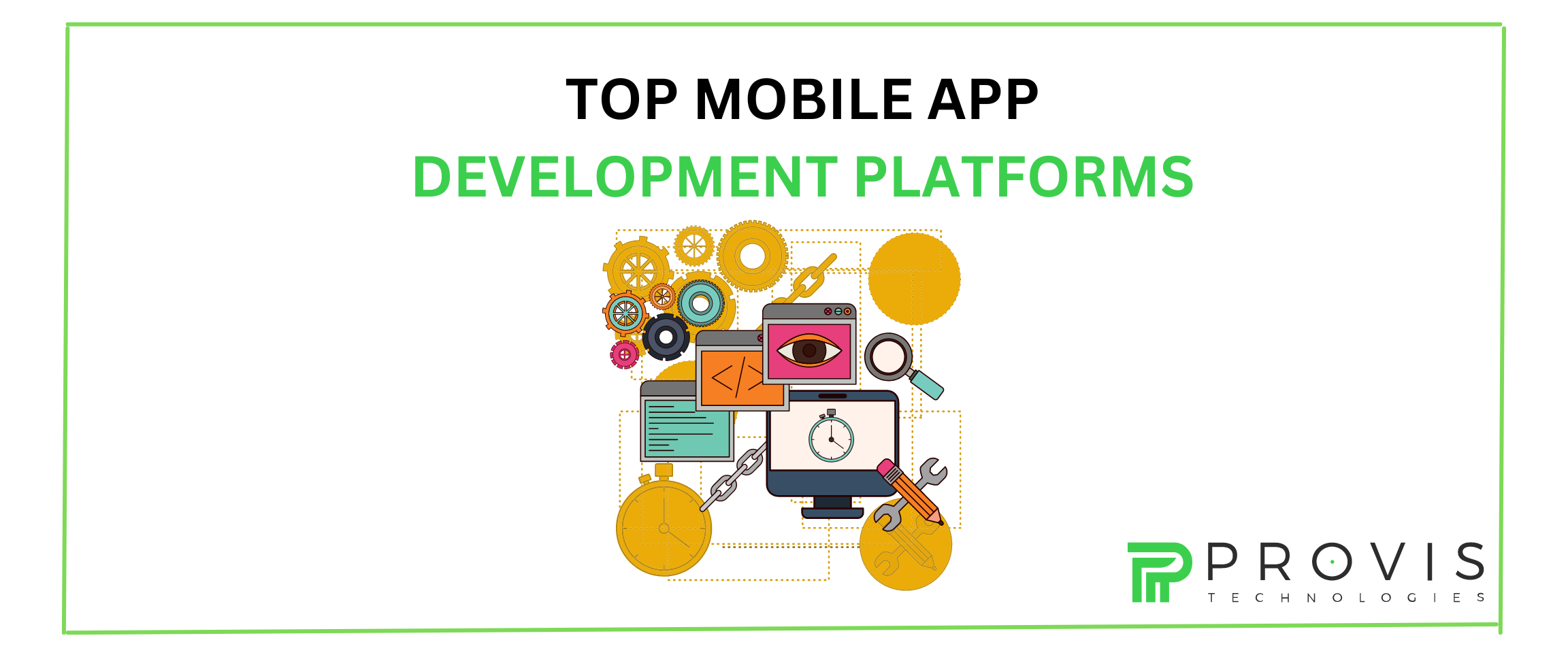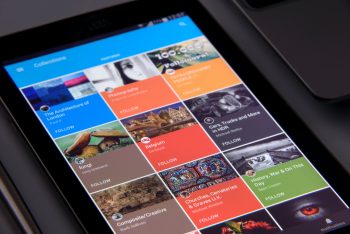Have you ever counted the number of mobile apps on your phone? Every day, new apps are launched. There are some apps on our phones that we don’t even use. But have you ever wondered what is behind those apps and on what mobile app development platforms they are built?
Investing in a mobile app is a golden opportunity in this rapidly growing market.
From cab bookings to nursery rhymes, there are apps in various sectors. Most apps today have a subscription model, which will be provided to you after a certain amount. The premium model comprises additional benefits. So in one way or another, the companies benefit from the app market.
You must have some creative ideas, but a lack of coding skills is a hindrance. You must have heard of no-code apps. Yes, apps can be developed without coding confusion.
If you want to know about the top mobile app development platforms, this blog is helpful. But before jumping on the top mobile app development platforms, let us understand what a mobile app development platform is.
Mobile App Development Platform: What is it?
The mobile app development platform provides the foundation and structure needed to develop apps. It is software that allows businesses to design, create, and maintain mobile applications. In addition, these platforms support application development using various tools for multiple programming languages.
Earlier developers went through complex programming processes, which is not a concern nowadays. But now, from building, testing, optimizing, and deploying, all procedure is done under one platform.
Every platform provides different features. Therefore, it is entirely up to the developer to decide which to use based on the requirements. Previously, developers used different platforms for frontend, backend, UI, and many more. But now you can bypass those processes as platforms are available with the latest technology.
Also Read: How to Choose a Mobile App Development Framework: A Beginner’s Guide
Here are some key factors that you should consider while developing an app.
Factors To Consider Before Choosing A Mobile App Development Platform
Mobile app development is a crucial process that requires a lot of research. Some points to focus on before selecting a platform-
- Speed – Every user prefers a speedy app. Users do not like slow-loading pages.
- Security – Security is crucial while developing an app. Users are highly concerned about security. Security vulnerabilities can be reduced if you choose a vigorous app development platform.
- AI Services – AI is in high demand right now. It helps improve the customer experience. The greater the user experience, the more downloads there will be.
- Scalability – Pick a platform that can handle large-size projects in the long run. It should meet your long-term goals.
- Platform Compatibility – There are two main platforms that are Android and iOS. It should develop apps that are compatible with both platforms. In addition, it should support cross-platform apps.
- Codeless or low code platform – Less coding knowledge is not an issue nowadays as some platforms provide no-coding applications.
Top Mobile App Development Platforms
It is a free and open-source mobile UI framework supported by Google. Its versatility is highly commendable in UI construction. Moreover, it lets developers create native applications using a single codebase, which saves time and money.
It employs the Dart programming language, which helps create powerful apps.
Flutter comprises two important parts: an SDK and a Framework. Flutter is a different and modern framework that is easy to learn and use. It allows you to change the code and see the result in real time. Its simplicity and performance make it the top choice for startup MVPs.
The native code in Flutter enhances the performance of both the iOS and Android platforms. In addition, Flutter is backed by Google, which is one of its biggest advantages.
Features –
– Develops high-performance apps
- It supports both iOS and Android platforms
- Easy to learn and use
- Ready-made widgets for fast UI coding
- Detailed documentation
- Active community support
- Rich motion APIs
2. React Native
React Native is a popular Java script created by Facebook that lets you build natively-rendered mobile apps for Android and iOS. It allows developers to build applications for different platforms with a single codebase, saving time and resources.
Furthermore, It is the most popular platform for app development and is built on React – a Javascript library that is already famous. It primarily focuses on providing a great user experience.
With React Native, you can build high-performing and efficient applications. Code reusability is the main benefit of React Native. Reusing code leads to fast development and cost efficiency.
It does not allow rendering web views in its code, which creates differentiation from other platforms.
Features –
- It provides code reusability.
- Compatible with third-party plugins
- It supports both iOS and Android platforms
- A large community of tech experts
- Strong developer tools
- High-performance apps
- Quick development
- Faster time to network
3. Xamarin
The platform is used to develop cross-platform applications with a C# codebase. It is widely preferred by developers because of its monitoring capabilities and thorough testing process.
Apps developed through Xamarin provide an entirely native look and feel. It lets developers share code across all platforms. This platform allows you to apply for Java, Objective-C, and C++ libraries. It runs in a managed environment with facilities like memory allocation and garbage collection.
It provides a native UI interface and API access. As a cross-platform and open-source platform, it is well known for offering development ecosystems with APIs, backends, and components.
Features –
- Best backend infrastructure
- Native performance and user experience
- Easy to keep updated
- Maintenance is a breeze
- Powerful tech stack
- Allows application indexing
- Independent development environment
4. Ionic
Ionic is well known for its hybrid mobile and progressive web apps and cross-platform capabilities. It is an open-source UI toolkit for building high-quality and performance apps. It focuses on front-end user experience to make the app visually appealing.
The apps built through Ionic are simple and have all the functionality. One of the many benefits of using Ionic is the ability to build and ship applications to deployable locations simultaneously.
It allows developers to load the developed applications rapidly. Ionic guarantees swift and effective functionality on every device.
Features –
- Well-written documentation
- Offers a wide range of plugins and UI components
- Cross-platform mobile application development
- Platform-independent framework
- High performance
- Provide native-language experience
- Fast and powerful development platform
5. Unity
This platform is widely known for its incredible graphics. However, it is used for more than just mobile apps. It is known as an IOC container by Microsoft. It assists in object creation and decoupling the module dependencies in work.
You can also join the Unity Connect network of experts and developers.
Features –
- Simple setup
- Easy to use
- Incredible graphics
- Provide a positive experience with players
Also Read: WooCommerce vs Shopify Which is Best for Your E-commerce in 2024?
Final Thoughts –
Selecting the best platform for mobile app development is crucial for any business. Every platform is best in some way or another. The decision lies in your hands. Choose according to your business objectives and requirements.
Conduct detailed research on the given platforms and choose accordingly. Consider the features like speed, cost, compatibility, scalability, etc.
We at Provis Technologies develop apps with the latest trends and technologies. The developers here design user-friendly and responsive apps. The use of advanced technology to create high-quality apps.
Our team of proficient developers can tackle modern application development and provide high-performance apps. At Provis Technologies, we would be glad to build your applications.
We build world-class, unbeatable native iOS and Android apps that meet business needs.
We develop standard apps in any category. Our agile team delivers robust mobile apps that provide an amazing customer experience.
Regardless of business type, we provide diverse mobile applications.
Written By
Author's Picks
- A Complete Guide to Pharmacy Management Software Development
- 09/09/2024
- The Role of IoT in Web & Mobile App Development for Smart Homes
- 11/11/2024
- A Complete Checklist to Build a Secure Mobile App
- 20/08/2024
Categories
- AI for Startups
- AI in Web Development
- AI Integration
- AI Platforms
- AI Prompt
- AI Tools
- AI Trading Software
- Android App
- Android vs iOS Development
- Angular
- API
- API Development
- App
- app development
- App Idea
- App User Feedback
- Application
- Artificial Intelligence
- Audit Services
- Automotive Industry
- Awards and Recognition
- Business Consulting
- Business Website
- Chatbots
- CRM
- CRM for Financial Advisors
- Custom CRM
- Custom SaaS
- Custom Website
- Customer Service
- dashboard design
- Developing a Mobile App
- Digital Business
- E-commerce
- EMR Integration
- Finance
- Financial Advisors
- Financial Advisors
- GIT
- Health Insurance
- iOS App
- iOS App Development
- IoT Mobile App Development
- IoT Platforms
- IT Audit Services
- IT Consulting
- IT Strategies
- Java Development
- Laravel
- Lean Canvas
- Learning Management System
- Logistics Apps
- Mobile App Development
- MVP
- Native App
- News Aggregator Site
- OTT
- Outsourcing IT
- Payment Gateway
- predictive analysis
- Product Launch Strategy
- Progressive Web App (PWA)
- Prototype
- Recommender Systems
- Ruby
- SaaS
- SaaS Application
- SaaS Business
- SaaS Company
- SaaS Development
- SaaS Product
- SaaS Project
- Sales Funnel
- SEO
- Shopping Cart
- Software Development
- SSL and TLS
- Startup Checklist
- Technology
- Tetradic Color Scheme
- UI/UX Design Company
- Unit Testing
- User Flow
- User Testing
- Web Development
- Web Performance Optimization
- website Maintenance Services
- Website Migration Service
- Website Speed Optimization
- WooCommerce
- WordPress






